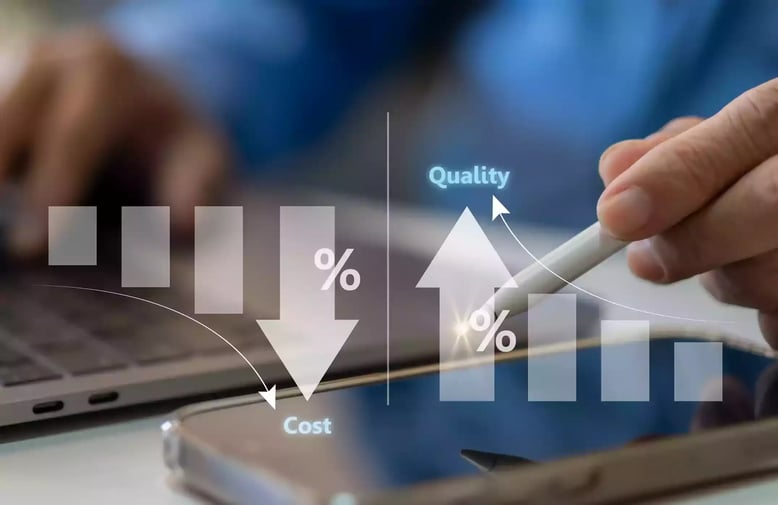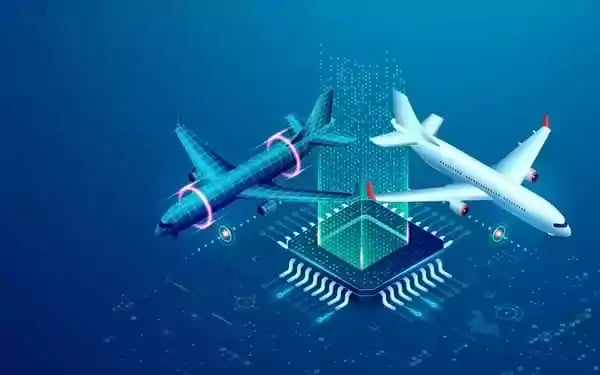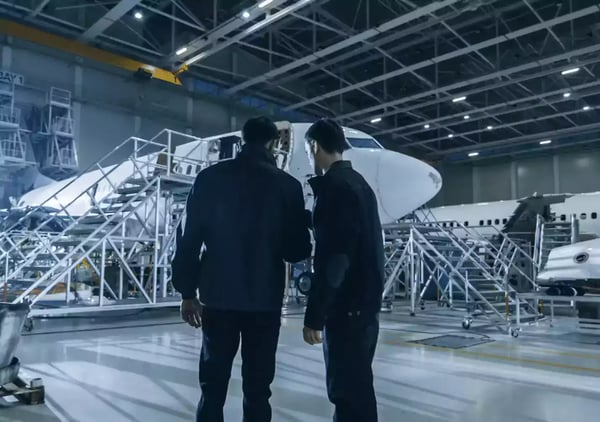How is AI in aviation maintenance changing the industry?
The aviation industry is entering a new era with artificial intelligence transforming maintenance practices. AI is revolutionizing aviation maintenance, adding new dimensions to predictive capabilities and operational efficiency. To get a broader understanding of MRO software and its vital role in this transformation, explore our detailed guide on everything you need to know about MRO software.
This article will delve into the various ways AI is being integrated into aviation maintenance, from predictive maintenance to real-time data analysis.
You will gain an understanding of how AI helps prevent unscheduled maintenance, minimizes aircraft downtime, and enhances overall fleet management. This will explain the significant impact AI has on the aviation industry's operational strategies and future advancements.
The current state of fleet management and aviation maintenance technology
The current state of aircraft maintenance planning is facing significant inefficiencies and challenges. A study discovered that approximately 25% of flights in the US experience delays. These delays are primarily caused by issues within the airlines, such as insufficient staff or maintenance problems. Maintenance planning processes in the industry often rely on outdated methods such as pen and paper or Excel sheets, leading to resourcing inefficiencies and operational bottlenecks.
Recognizing the need for digital transformation in preventative maintenance planning, advanced AI-based innovative solutions are emerging to streamline tooling control and enable paperless operations.
However, the aviation industry faces looming resource shortages for technicians and engineers. According to Boeing's Pilot and Technician Outlook, there is an anticipated need for hundreds of thousands of new technicians over the next two decades to meet the growing demands of the industry. This massive personnel shortage underscores the importance of efficient resourcing of existing staff and adopting smart software solutions for maintenance management. By leveraging AI-driven maintenance technology, airlines can optimize their current workforce, ensuring that the right resources are available at the right time.
Let’s explore AI’s pivotal role in aviation maintenance. We will examine how it's changing the industry and its potential impact on the future of air travel.
Improving safety and reducing downtime
AI's integration into aviation maintenance operations has the potential to prevent unscheduled maintenance, thereby mitigating the risks of grounded planes and flight delays. Additionally, real-time AI predictive maintenance enables early detection of potential issues, allowing for proactive interventions before they escalate into safety hazards.
AI algorithms can help airlines proactively forecast potential issues, such as equipment failures and maintenance needs, with remarkable accuracy. They achieve this by analyzing vast datasets from aircraft systems, sensors, and historical maintenance records. This, in turn, reduces unscheduled maintenance and minimizes aircraft downtime.
For example, Lufthansa Technik has implemented AI-powered predictive maintenance systems. Their Condition Analytics solution uses machine learning algorithms to analyze sensor data from aircraft components and predict maintenance requirements.
Cost-Effective Maintenance Management

The cost-saving potential of AI-driven maintenance strategies is multifaceted. AI's ability to detect even the smallest faults or discrepancies in the aircraft system minimizes the need for redundant preventive maintenance checks. This translates into tangible cost reductions. Moreover, the seamless integration of AI tools into existing infrastructures amplifies their cost-effectiveness.
Beyond mere fault detection, AI algorithms analyze historical usage patterns, maintenance schedules, and supply chain data to enhance inventory management. By accurately predicting the demand for spare parts, which can then be bought from an aircraft parts marketplace and optimizing stock levels, AI minimizes inventory costs while ensuring the availability of critical components when needed. This significantly enhances airlines' preventative maintenance strategy.
Optimizing Fleet Management
Central to AI's transformative impact is its role in optimizing a fleet of aircraft. Through predictive maintenance, aviation maintenance teams gain access to real-time performance operational data, fostering proactive maintenance interventions and prolonging fleet lifespans. Additionally, improved fleet management means that the aviation industry can reduce the chances of cancellations, minimize flight disruptions, and reduce turnaround times, resulting in higher revenue.
Automated visual inspections represent another frontier in fleet management revolutionized by AI. It enables automated visual inspections of aircraft components, such as engines, airframes, and wings. Using computer vision technology, AI algorithms can analyze images or video footage to identify defects and anomalies across critical aircraft components. This streamlines the inspection process and enhances accuracy.
Reputed brands such as Rolls-Royce have adopted advanced AI maintenance technology like Enginedata.io & Aviadex.io by QOCO to monitor engine data in real-time. By proactively addressing maintenance issues, Rolls-Royce not only minimizes downtime but also significantly increases the reliability and performance of their engines. This underscores the transformative potential of AI in aviation maintenance.
Empowering Decision-Making and Workload Optimization
AI allows for continuous monitoring of several aircraft systems 24/7, providing data collection and analysis that is beyond human capability. The highly complex algorithms used by AI, coupled with the extensive database that is used to generate predictions and reports, provides detailed information that the aviation industry can utilize to improve safety, efficiency, and overall operations.
AI can assist maintenance managers and engineers in making informed decisions. By leveraging machine learning and data analysis techniques, AI systems can provide insights into maintenance planning, resource allocation, and fleet performance optimization, ultimately improving operational efficiency.
The aviation industry is continuously shifting towards implementing AI technology in maintenance and safety procedures. It is for the benefit of everyone involved, whether it be the airline, aviation team, or passengers; it is important to make aviation maintenance safer, efficient, and cost-effective. Given the potential for AI in aviation maintenance, it is apparent that technology is the future of aviation maintenance. The integration of AI in aviation maintenance is undeniably the right step toward a safer, modern, and efficient aviation sector.
In-depth analysis and reporting
AI enables continuous monitoring of multiple aircraft systems round the clock. It collects and analyzes data beyond human capability. The complex algorithms and extensive database used by AI provide detailed information. Airlines can utilize this to enhance safety, efficiency, and overall operations.
AI can assist maintenance managers and engineers in making informed decisions. By leveraging machine learning and data analysis techniques, AI systems can provide insights into maintenance planning, resource allocation, and fleet performance optimization, ultimately improving operational efficiency.
The aviation industry is continuously shifting towards implementing AI technology in maintenance and safety procedures. It is for the benefit of everyone involved, whether it be the airline, aviation team, or passengers; hence, it is important to make aviation maintenance safer, efficient, and cost-effective. Given the potential for AI in aviation maintenance, it is apparent that technology is the future of aviation maintenance.
Consequently, the integration of AI in aviation maintenance is undeniably the right step toward a safer, modern, and efficient aviation sector.

Challenges and Future Outlook
Looking forward, there's a lot of potential for AI In aviation maintenance technology. As technology gets better and more airlines adopt AI-based technology, we can expect even safer and more efficient flights. However, it's important for everyone involved to work together to deal with rules, ethics, and keep pushing for new ideas.
Innovative solutions like MROTools.io– Assignment are stepping up to address industry needs.
Developed through actual on-site experience in hangars and on aprons, MROTools.io- Assignment seamlessly integrates Flight Ops Systems, M&E Systems, and HR data. Its visual interface simplifies planning by providing granular visibility on all aspects of maintenance.
One standout feature is its integration with flight operations and M&E systems, offering real-time data on aircraft arrivals, gates, and departures. This enables planners to allocate manpower efficiently and adapt to changes in flight schedules. It's not just data; it's actionable intelligence.
Read more on automated aircraft maintenance planning and resourcing.




 Jichen Lu
Jichen Lu
 If you are interested in knowing how you can improve your efficiency in maintenance operations, book a 30-minutes discovery call with us.
If you are interested in knowing how you can improve your efficiency in maintenance operations, book a 30-minutes discovery call with us..jpg?width=600&name=iStock-1393093359%20(1).jpg)

